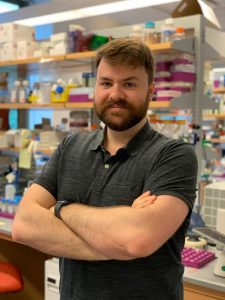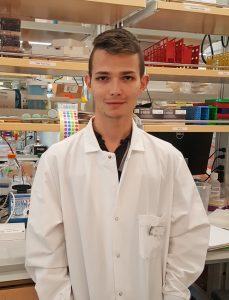2019 Grantees
 Alessandra Dall’Agnese, Ph.D., is at the Whitehead Institute at MIT in the laboratory of Richard Young, Ph.D. Her research aims to identify the unstructured parts of proteins relevant to hard-to-treat cancers and find drugs that would target them to impede the formation of transcriptional components of cancer-driving genes. She received her B.Sc. in Biotechnology from the University of Undine in Italy, M.Sc. in Functional Genomics from University of Trieste, Italy, and Ph.D. in Biomedical Sciences, Sanford Burnham Prebys Medical Discovery Institute in La Jolla, CA.
Alessandra Dall’Agnese, Ph.D., is at the Whitehead Institute at MIT in the laboratory of Richard Young, Ph.D. Her research aims to identify the unstructured parts of proteins relevant to hard-to-treat cancers and find drugs that would target them to impede the formation of transcriptional components of cancer-driving genes. She received her B.Sc. in Biotechnology from the University of Undine in Italy, M.Sc. in Functional Genomics from University of Trieste, Italy, and Ph.D. in Biomedical Sciences, Sanford Burnham Prebys Medical Discovery Institute in La Jolla, CA.
Her project focuses on ovarian cancer and as time permits, extend these studies to other difficult-to-treat cancers such as pancreatic and small cell lung cancer. For years drug discovery focused on developing drugs that target structured points of proteins that repeat the expression of genes relevant to cancer. This strategy has been very useful to treat multiple types of cancers in patients but not difficult-to-treat cancers. There is therefore the urgent need to develop novel strategies to treat difficult-to-treat cancer. Alessandra’s lab recently discovered that also unstructured parts of proteins play major roles since they allow for the compartmentalization of the transcriptional opponents at genes important for cell identity. This project is innovative as it aims at identifying the unstructured parts of proteins relevant to hard-to-treat cancer and find drugs that would target them to impede the formation of transcriptional components of cancer-driving genes.
Dr. Dall’Agnese is the Hope Funds for Cancer Research Parks Family Fellow
 Matthew E. Griffin, Ph.D., is at The Rockefeller University in the laboratory of Howard Hang. His work aims to improve the effectiveness of immune checkpoint inhibitors (ICIs) by better understanding the causal relationships between individual microbial species in the gut and drug efficacy and providing novel strategies to broadly improve ICI efficacy against many cancers. He received his B.S. in Biological Chemistry from Tulane University, New Orleans and his Ph.D. in Chemistry from California Institute of Technology, Pasadena CA.
Matthew E. Griffin, Ph.D., is at The Rockefeller University in the laboratory of Howard Hang. His work aims to improve the effectiveness of immune checkpoint inhibitors (ICIs) by better understanding the causal relationships between individual microbial species in the gut and drug efficacy and providing novel strategies to broadly improve ICI efficacy against many cancers. He received his B.S. in Biological Chemistry from Tulane University, New Orleans and his Ph.D. in Chemistry from California Institute of Technology, Pasadena CA.
His project aims to improve the effectiveness of immune checkpoint inhibitors (ICIs) by better understanding the causal relationships between individual microbial species in the gut and drug efficacy. Currently, ICIs are FDA-approved for use against a variety of cancers including melanoma, non-small cell lung cancer, renal cell carcinoma, Hodgkin’s disease, head-and-neck cancer, urothelial cancer, MSI-h cancer, bladder cancer, gastroesophageal junction cancer, and hepatocellular carcinoma. Moreover, at the end of 2018, 2,000 clinical trails using ICIs were in progress, suggesting that the use of ICIs against other difficult-to-treat cancers will continue to increase in the future. Therefore, if successful, this project should provide basic insights into the mechanisms of ICI activity and may provide novel strategies to broadly improve ICI efficacy against many cancers through rational probiotic supplementation. Matt’s lab has now come to understand that microbes living within our gut can exert wide-ranging and often unexpected effects on our health. In particular, it has become clear that our gut microbiota can greatly affect our response to a variety of cancer drugs. However, most of these observations remain correlative, and we generally do not know the specific characteristics that allow microbial species to change drug efficacy. In this project, Matt and colleagues will explore the bacterial genus Enterococcus, which has been correlated with improve immune checkpoint inhibitor therapy and delineate the unique attributes of these bacteria that can augment therapeutic intervention. By discovering the protein and cellular attributes of enterococci that are necessary for its activity during cancer treatment, we will provide the first direct evidence of the molecular factors used by these bacteria to control host response to immune checkpoint inhibitors. If successful, his lab envisions that this project will enable the discover of new biomarkers to predict patient response to these drugs prior to treatment, the rational design of probiotic supplements for use in combination with cancer immunotherapy, and a roadmap to discover new protective microbes guided by the molecular factors they discover here.
 Mateusz Legut, Ph.D., is at the New York Genome Center at NYU in the laboratory of Dr. Neville Sanjana, Ph.D., which he joined because of his interest in applying functional genomics to study interactions of the immune system with cancer. His current work involves using genome engineering to develop first-in-kind effective immunotherapies for pancreatic cancer. He received his B.Sc. in Biotechnology from University of Wroclaw in Poland, and his Ph.D. in Cancer Immunology from Cardiff University School of Medicine in Wales, UK.
Mateusz Legut, Ph.D., is at the New York Genome Center at NYU in the laboratory of Dr. Neville Sanjana, Ph.D., which he joined because of his interest in applying functional genomics to study interactions of the immune system with cancer. His current work involves using genome engineering to develop first-in-kind effective immunotherapies for pancreatic cancer. He received his B.Sc. in Biotechnology from University of Wroclaw in Poland, and his Ph.D. in Cancer Immunology from Cardiff University School of Medicine in Wales, UK.
His project focuses on new therapies for pancreatic cancer. Approximately 50,000 people in the US are diagnoses with pancreatic cancer every year – unfortunately, only 7% of patient survive for more than 5 years after diagnosis. 50% of diagnoses patient die within the first 6 months, and the survival rate has not improved significantly since the 1970s, showing an unmet need for innovative approaches. Immunotherapies, being in essence therapies using body’s own immune system to fight cancer, have revolutionized treatment of some cancer, especially skin and blood. Unfortunately, current immunotherapies have filed to drive regression of pancreatic cancer in human patients. One of the potential reasons for that is the ability of pancreatic cancer to avoid detection by the immune system, and to turn off the immune cells that manage to infiltrate it. In this project Matt will use genetic engineering in human immune cells, called T-cells, to find the genes that would allow them to fight back against pancreatic cancer and to resist the ability of pancreatic cancer to turn them off. He will test all 20,000 genes in the human genome for their ability to turn T-cells into superior pancreatic cancer killers. To that effect I will use the CRISPR/Cas9 technology. While mostly known as “molecular scissors” useful for taking out specific genes, CRISPR/Cas9 can also be used to turn on the genes of choice. I will use both approaches (taking out suppressive genes in T-cells and turn on activating genes) to find out new targets that can be used in the clinic. The use of CRISPR/Cas9 genome engineering in T-cells used for cancer immunotherapy has already entered the clinic, and he expects it will become mainstream in the coming decade. He states that finding out which genes to target will allow his lab to engineer bespoke T-cells able to search and destroy hard-to-treat cancers, by making them better at overcoming cancer’s defense mechanisms.
